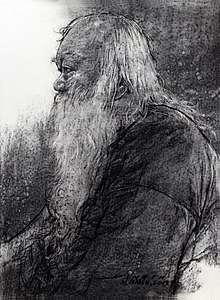Thawan Duchanee
Thawan Duchanee (September 27, 1939 – September 3, 2014) was a Thai contemporary painter, architect and sculptor with an international reputation. In 2001, this notable artist was given the prize by the Office of the National Culture Commission of Thailand as the National Thai Artist in Fine art and Visual art.
Thawan Duchanee | |
|---|---|
 | |
| Born | September 27, 1939 |
| Died | September 3, 2014 (aged 74) Bangkok, Thailand |
| Nationality | Thai |
| Years active | 1939–2014 |
| Known for |
|
Thawan was raised in Chiang Rai, Thailand and started art studies at the age of fifteen at the Art and Craft College under the scholarship of the Ministry of Education of Thailand. In 1958, he furthered his studies at Painting, Sculpture and Graphic Art department, Silpakorn University.
Biography
Early life and education
Thawan appeared to be prodigiously gifted artist since he was a child. In his youth, he had a consuming passion for Buddhism. His attitude toward his work, however, had been changed since he belonged to the last generation of Silpa Bhirasri’s students at Silpakorn University. Thawan got good grades from his drawing works with his drawing works in university all along but he earned a low grade in Silpa’s drawing class. The reason his teacher gave to him is ‘your fish have no fishy smell, your bird can’t fly through the air, your horse can’t be ridden or rushed. You are just a copier not an actual artist’. Since then, Thawan started to work in a different way and became an outstanding student.
Illness and death
After three months hospitalizations because of complications from hypertension and diabetes. Thawan died of liver failure on September 3, 2014 at the age of 74.
The funeral was held at Wat Debsirindrawas in Bangkok. The honoured cremation was bestowed by the Her Royal Highness Princess Maha Chakri Sirindhorn.
Work philosophy
Buddhist references have played an important role in Thawan’s works. According to one of notable works, a series of Ramayana paintings he presented all of the characters in his own interpretation. Thawan earned a worldwide reputation as a Thai contemporary artist from these buddhist painting.[1]
“Art is beyond nature and intellect” Thawan said. He gave priority to human artistic creativity in artworks.[2]
Style and media
Thawan was the first engraver using a new technique. He used special ballpoint pen to create engravings containing millions of strokes. After working in this way for a while,a doctor suggested him to stop because the way he worked had a disastrous effect on his health.
Thawan also created the painting by Zen brush in order to present a Zen philosophy in artistic form.
The unique characteristic of Thawan’s painting including not only form and religious story but also the colour he used. After learning about Chinese, Indian and Japanese artworks which characteristic is monochrome painting, He was inspired to paint in black and white in order to precisely express inner feelings.
Thawan is not only famous for his paintings but also architecture. His architectural masterpiece is Black House. It was the residence for Thawan for the rest of his life.
List of major works
Paintings
- The Dhammapada [3]
- The Battle of Mara
- The Last Ten Lives of the Buddha
- Seeing what is Visible
Buildings
- Buddhist Medication Room
- The Biggest Work of the Painter is not a Painting
Critical responses
His artworks are not widely accepted in the first place. A group of student demonstration destroyed his works because they considered them as religious insults. His paintings, however, eventually are mastered and valued as can be seen nowadays.
References
- Hoskin,J and Invernizzi,L.(n.d.).Ten Thai Contemporary Artist.Bangkok : Graphis. .
- Marcus, R.(2013).Thawan Duchanee. Modern Buddhist Artist.Silkworm Books
- Rutter,T.Thawan Duchanee Ramayana 73.British Council.